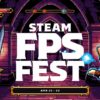As if a throwback of its own, many of this past week’s reveals have been accompanied by limited game demos, to give players a taste of things to come.
Whether it’s to make up for the fact there’s no real in-person event to celebrate the medium this year or not, we’re glad for it because we’ve discovered a number of excellent games that might have snuck beneath the radar otherwise.
A number of these, such as Anger Foot and Cult of the Lamb, have accompanied reveals and new trailers, but the others come courtesy of this year’s Steam Next Fest, which kicks off this week on June 14. It’s a multi-day celebration of the games of tomorrow, and there are literally hundreds of demos on offer.
Here’s a handful that stood out to us.
Anger Foot
Anger Foot is a legitimate acid trip of a game that combines the frenetic breach and clear behaviours of Hotline Miami with the boot-happy combat of Bulletstorm. The demo offers up two levels, both of which can be stormed through in well under a minute, and between them, it introduces all of the key mechanics you’re going to bring to bear.
Obviously, there’s that titular angry foot of yours. It’s going to be the main catalyst of the carnage you cause, reducing doors to kindling and upending all kinds of furnishings. You’re introduced to a handgun in the second level, though we know it escalates even further based on the reveal trailer.
I love how the game seems to mimic the mask concept from Hotline Miami and applies it to sneakers, giving the player unlockables to strive for that actually impact how you play. I’m particularly eager to try out the pair of shoes that turns any kicked-in door into a ticking time bomb.
Click here for the Anger Foot demo.
Cult of the Lamb
When I got to speak with Julian of Massive Monster last year after Cult of the Lamb’s initial reveal at Gamescom Opening Night Live, the way he spoke about the game and its influences—most of which it wears on its sleeve—I knew we were in for something absolutely special.
If the promise of the ritual sacrifice of woodland critters didn’t already have you hooked, it’s worth noting that under all of the disarmingly adorable aesthetic is a grisly game about the occult that feels like a mash-up of several genres. Based on the demo, there isn’t one is handles poorly.
Moment-to-moment is handled a lot like Death’s Door did, with the branching level flow feeling a bit like last year’s Inscryption. But it’s the moments in between that set the game apart, with team-building exercises like forced labour and sacrifice it’s going to be a tall order to keep morale afloat.
But trying to do so is one hell of a time.
Click here for the Cult of the Lamb demo.
The Last Worker
After two levels with The Last Worker, it’s clear that the game is going to be best experienced with virtual reality. It’s a slow, plodding, and largely narrative ‘walking simulator’. I say walking, though your character Kurt commutes about in one of the floating chairs from Wall-E.
The demo doesn’t the narrative a bit of a disservice, the levels feel like they’re at opposite ends of the game almost. And even if Kurt, the player-character, is a bit of a curmudgeon, it’s hard not to love Skew, a deluded little helper bot who’s oblivious to the fact the world has ended.
Kurt’s once role as a factory picker-packer of sorts makes up a bulk of the core loop. With just a small anti-gravity device, meant for the movement of benign stock, you’re able to defend yourself from guard projectiles or seek refuge in nooks or behind conspicuous crates of livestock.
It’s a promising enough game with a rich setting, although the next time I play it I might need to aim to wear the goggles for full immersion.
Click here for the The Last Worker demo.
Sanya
Sanya is perhaps the shortest of the demos I sampled, but it’s certainly one of the most endearing. It’s a nice and simple slice of life narrative adventure about the wholesome childhood of a boy named Sanya.
It’s based in the 90s in a post-soviet Russian town, and it feels reminiscent and full of wonder.
It’s a return to the classic point-and-click adventure game, framing ordinary life events through that familiar childhood lens we’re all familiar with. I feel like this game is going to be a nostalgic trip back in time, plus it’s impossible not to fall in love with the absolutely gorgeous art style.
Click here for the Sanya demo.
WrestleQuest
What I wouldn’t have done to have this game around when I was a young kid with a penchant for professional wrestling. A few bruises and scrapes could have been avoided, as I’d have easily opted for this over throwing myself from my garage roof onto the punishing cardboard boxes below.
As a role-playing game, there’s some surprising depth to WrestleQuest, the fact it’s steeped in classic wrestling lore just makes it all the cooler. It takes all of the big moves, the trash talk, and gimmicks and turns them into focal points of this expansive adventure that draws inspiration from legends like “Macho Man” Randy Savage, and Andre the Giant.
Whatcha gonna do, brother?
Click here for the WrestleQuest demo.
Metal: Hellsinger
What if DOOM Eternal was a rhythm game? That’s pretty much the elevator pitch for Metal: Hellsinger, but simply calling it that would be doing the game a disservice. Sure it’s got the same hellish aesthetic, forward-pushing combat and ball-blasting metal soundtrack, but this is a beast all its own.
I’ve quite literally played through the level on offer in the Metal: Hellsinger demo 30+ times by now and every single time is a new effort to eek out just that little bit higher of a score over my previous runs. Whether it’s keeping my shots perfectly timed to the beat, deftly avoiding damage, ratcheting up a huge hit streak or ensuring my Fury multiplier stays at 16x for as much of the run as possible there’s no shortage of ways to get better each time. When you’re in the moment, the level’s glorious metal track is playing in full and everything is syncing up perfectly it’s bloody exhilarating. Play this demo, I implore you.
Click here for the Metal: Hellsinger demo.
Wylde Flowers
Coming from Melbourne’s own Studio Drydock, I’ve been keen to get my hands on Wylde Flowers since I first laid eyes on it. I mean, who doesn’t love a good narrative-driven farming/life sim with a witchy twist? After playing through what’s on offer in the Next Fest demo I’m happy to report that it’s exactly as charming and fun as I’d expected.
In the demo, you’ll get to sample a lot of what the game has to offer from foraging, farming, crafting, and cooking to meeting its varied and friendly cast of characters, exploring Fairhaven, and maybe discovering a little mystery and magic. I think my favourite thing about Wylde Flowers so far – aside from the gorgeous visuals and sound design – is just how welcoming and diverse it is, which explains how it won the award for Inclusivity at this year’s Apple Design Awards.
Also, the way that your character, Tara, nimbly hops over fences instead of forcing you to trudge around them is top-tier game design.
Click here for the Wylde Flowers demo when it goes live on June 14th.
The Cub
Described as “The Jungle Book meets the armageddon”, The Cub is something of a follow-up to the excellent Golf Club: Wasteland from the team at Demagog Studio. Rather than presented through the medium of golf though, this time it’s a side-scrolling puzzle platformer reminiscent of old-school 16/32-bit era games.
Without spoiling too much of its predecessor, I’m instantly enamoured by the parallel story being told here. The demo gives you a taste of the beginning of the game as well as hand-picked slices of a couple of later levels, and it’s evident that The Cub has every bit as much character as Golf Club: Wasteland. Right down to the sounds of Radio Nostalgia playing all through your time spent exploring the post-apocalyptic landscapes, complete with quirky, otherworldly original music interspersed with fictional retellings of personal stories inside the game’s world.
I can tell you though, I wasn’t prepared for seeing this child being brutally impaled, eaten, and electrocuted. Oof.
Click here for the The Cub demo.
Power Chord
Here’s the pitch – a metal-themed deck builder/card-battling RPG with brutal battles and rogue-lite elements. Here’s my response – hell yeah, gimme that.
Power Chord is probably one of the most pleasant surprises out of the Next Fest demos I’ve sampled thus far. It’s slick, good-looking, and brimming with metal ‘tude. It’s also a very well-put-together card battler that’s instantly accessible and fast-paced but with a ton of scope for strategy and a great difficulty curve.
The game’s party-based card combat hinges on reacting appropriately to your enemies’ telegraphed moves, with hands that change just about every turn and cards that are only usable as long as you keep their respective party members alive. Buffs and debuffs are hugely vital but easy to read and understand, which is great because your health doesn’t restore in-between bouts on your road to take down the next big bad.
If you’re a fan of games like Slay the Spire or Darkest Dungeon, this is definitely worth checking out.
Click here for the Power Chord demo.
Signalis
Signalis pretty much immediately grabbed my attention with its slick, pixelated visuals and reverence for the PS1 survival adventures of old like Parasite Eve, Silent Hill, and Resident Evil. It mirrors those games quite closely with an isometric camera, ammo and inventory management, and light puzzle-solving informing its sci-fi horror setting.
What I was initially concerned about was that it would stick too closely to its inspirations and feel overly punishing or unwieldy, but thankfully after playing the demo that’s not the case. You’ve got the choice between modern or traditional ‘tank’ controls, for starters, as well as some welcome combat difficulty options. Visually, the settings for pixel scale and CRT-style filtering are also very cool to see – the latter in particular giving it a super authentic look that I highly recommend trying out.
I’m tentatively hopeful that the concept holds throughout the entire runtime of the game, but from this small taste, I’m definitely keen for more of Signalis.
Click here for the Signalis demo.
Melatonin
If the art and animation of Adventure Time met the rhythm mini-game action of Rhythm Heaven, you’d get something like Melatonin. In other words, it’s awesome.
Presented as a series of dream sequences, Melatonin tasks you with performing a wide variety of actions in self-contained levels based entirely on rhythmic button presses. You never know what you’ll be doing next, but it’s always something visually engaging thanks to its gorgeous, razor-sharp art and dreamlike colour palette. It’s also incredibly chill and significantly less daunting than most rhythm games, so don’t let the genre scare you away.
The demo is just a small taste and I hope things do ramp up a little in the full game, but the idea of extra challenge modes, level mashups, and even an editor has me super keen for its release in September.
Click here for the Melatonin demo.
As a reminder, Steam Next Fest kicks off on June 14, which is when the demos will become available to download.



